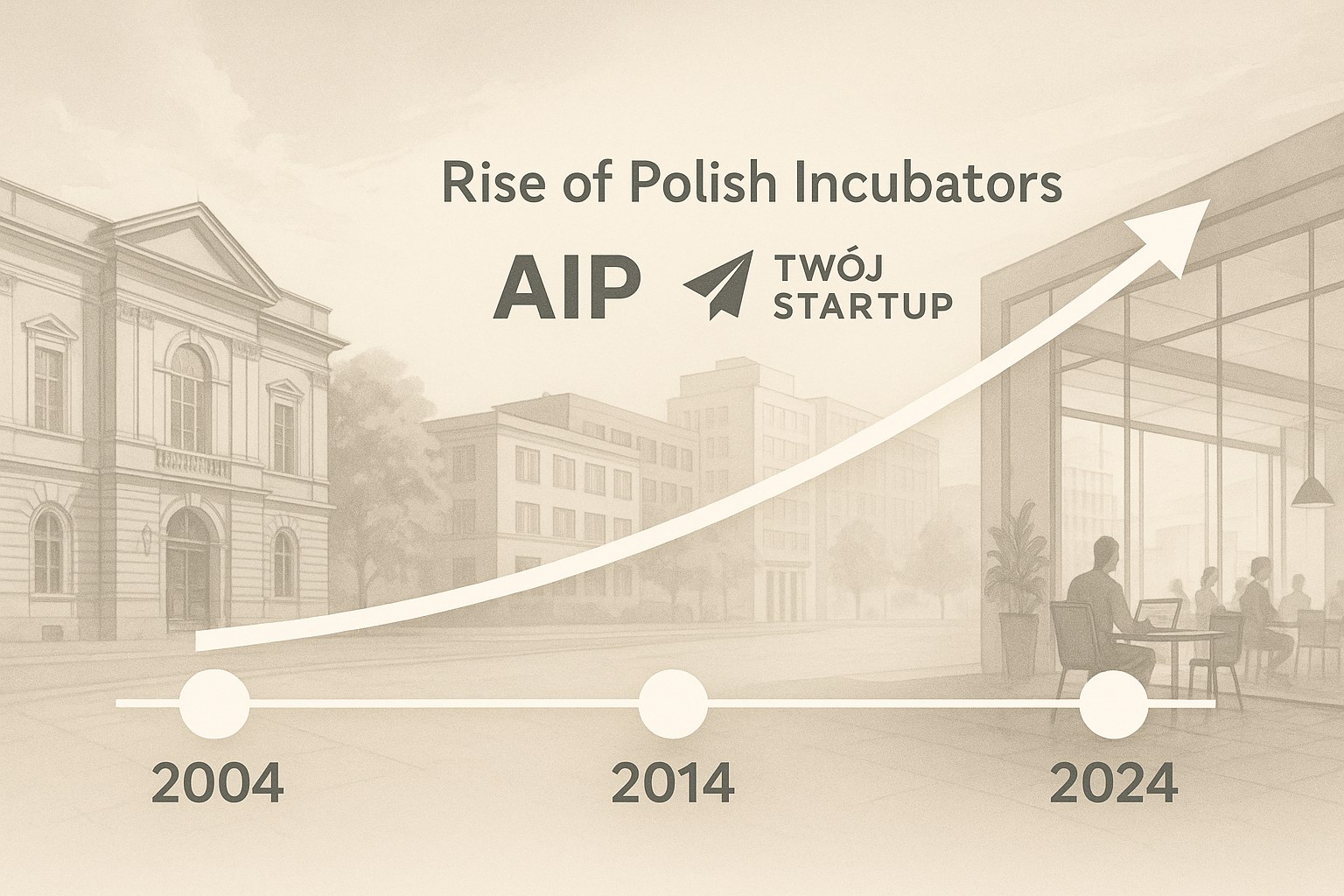A practical guide for Christian singles relocating to Poland who want real friendships, values-led dating, and a stable life beyond paperwork.
Check out the brand NEW WELCOME CENTRE
Freelancing in Poland as a foreigner is legally possible without starting your own company—if you use a business incubator. But despite their growing popularity, accurate and complete information about how incubators function under Polish law has been hard to come by—until now.
This article is the first-ever of its kind to fully expose the inner workings of Poland’s business incubator system for foreigners. We go beyond marketing claims and dive into the legal structures, contract models, taxation loopholes, immigration outcomes, and real-world user risks. Every section is grounded in publicly available documents, legal interpretations, and verified media sources. ✅
For years, official incubator websites have offered misleading simplifications:
What they often fail to explain is that these benefits come with specific conditions—and if you don’t follow them, the consequences can include tax penalties, denied visas, or even blacklisting by immigration.
This article is tailored specifically to foreigners who want to:
Whether you’re an English teacher, software developer, graphic designer, or coach—if your income is tied to creative work and you want a lawful, low-cost entry into Poland’s business ecosystem, this guide will show you exactly how (and when not) to use a Polish incubator.
You’ll learn:
This isn’t just another blog. It’s a legal reference, a survival guide, and a reality check—crafted with zero fluff and 100% verifiable sources. 🔍📑

Business incubators in Poland began not as tax optimization tools, but as part of an EU-backed mission to spark entrepreneurship—especially among students and first-time founders.
The first major player, Akademickie Inkubatory Przedsiębiorczości (AIP), was launched in 2004 with EU and Polish government support. It expanded quickly across universities, reaching 40 branches by 2011. Initially geared toward students, AIP soon opened its doors to all age groups, giving rise to what became the largest incubator network of its kind in Central and Eastern Europe. Startups like Chomikuj.pl and GoldenLine.pl were launched through AIP.
In 2012, the landscape shifted with the launch of Fundacja Rozwoju Przedsiębiorczości “Twój StartUp” (“Your StartUp Foundation”). Unlike AIP’s university-linked model, Twój StartUp focused on commercial viability and ease of access. By 2018, it had offices in over 20 cities and claimed to support more than 18,000 projects.
While both AIP and Twój StartUp are structured as non-profit foundations (fundacja), their models diverged. AIP emphasized pre-incubation—helping founders validate their ideas before starting a company. Twój StartUp introduced a “company-as-a-service” model, letting users invoice and operate legally under the foundation’s umbrella—without needing to start their own registered business. This innovation made it particularly attractive to foreigners and digital freelancers.
From 2018 to 2024, dozens of other incubators emerged—often small, regional, or industry-specific. Many were built on the same fundacja framework, but some now operate as for-profit LLCs, offering similar services but often with less transparency and more legal risk for users. These newer models tend to operate without public oversight, making due diligence even more essential.
The core legal mechanism remains consistent: the incubator provides its own tax number (NIP) and company registration (KRS) to “host” your business. You invoice clients through the incubator, and in return, the incubator pays you via civil-law contracts. All business activity is logged under the incubator’s official legal identity—not yours.
Today, incubators are no longer seen as mere student tools—they are a mainstream alternative for freelancers, remote workers, and solo entrepreneurs looking to avoid the bureaucracy and upfront costs of starting a sole proprietorship in Poland. But with popularity comes complexity—and that’s what the rest of this guide will unpack.

How can you run a business in Poland without registering a company? The answer lies in civil-law contracts executed through the incubator’s legal identity. This structure is not a loophole—it is explicitly permitted under Polish law.
When you join a Polish incubator, you sign a Cooperation Agreement (Umowa Współpracy) with the foundation. Legally, you become either a beneficiary or a contractor of the incubator. The incubator—typically a fundacja—has its own company registration number (KRS), tax number (NIP), and business license, and all commercial activities are conducted under its name—not yours.
Under this arrangement:
This structure has been confirmed in multiple official interpretations by the Polish Ministry of Finance. In a 2024 tax ruling, the government confirmed that a freelancer “cooperates with an incubator based on an umowa o dzieło” and that the incubator is the formal entity conducting business externally.
There are two main contract types used inside incubators:
Most incubators favor umowa o dzieło with transfer of copyright—because it enables the freelancer to apply the 50% tax deduction rule and completely bypass social insurance (ZUS) obligations. This can bring your effective tax rate to just ~6%.
⚠️ However, this setup only applies if you produce original, creative output—as defined by Polish copyright law. Routine services like basic consulting or admin work may not qualify, and in those cases, incubators will often default to umowa zlecenie, which incurs full tax and ZUS deductions.
For invoicing, most incubators provide you with a personal sub-account in their system. You bill clients using the incubator’s name, and they allocate your revenue internally. When it’s time to withdraw funds, you sign a contract and receive payment (minus applicable tax and service fees).
From a tax and regulatory point of view, the income and business risk legally belong to the incubator, not you. This means:
This model has no equivalent in many other countries—it is uniquely Polish in its reliance on foundation law and civil contracts. While incubators are not legally defined entities, they are recognized and respected by tax offices and immigration authorities as long as compliance is maintained.
In short: you are not starting a company—you are plugging into an existing one. This is why incubators work: they are fully legal, highly efficient, and potentially tax-optimized—as long as you follow the rules.

Joining a Polish incubator might feel like launching your own company in minutes, but what you’re actually doing is stepping into someone else’s legal framework. While the benefits are real, so are the responsibilities—and if misunderstood, they can cause serious problems with tax, payments, or immigration.
Here’s what the incubator setup really looks like:
Upon joining, you sign a Cooperation Agreement with the foundation. This defines you as a program participant—commonly called a “Beneficiary”—and outlines your rights and obligations. The foundation promises administrative support and access to its legal identity. You agree to follow their rules and pay fees. Some incubators also include access to legal consultations, limited coworking access, or startup mentoring.
You’re given a subaccount within the incubator’s internal ledger. When you invoice clients, you do so under the incubator’s tax ID and registration. The income goes to the incubator’s bank account, not yours. This money is earmarked under your name internally but technically belongs to the foundation until disbursed.
To withdraw funds, you must sign a civil-law contract: usually umowa o dzieło or umowa zlecenie. Most incubators favor umowa o dzieło for tax reasons (enabling the 50% cost rule). The incubator will then pay you the net amount after deducting taxes and their service fee. No funds are released without a signed contract.
Incubators charge for their services, even though they are often nonprofit entities. Common models include:
This covers legal structure, accounting, payments, and (in some cases) extras like legal consults or coworking space access.
Because all business is conducted under the foundation’s identity, the incubator retains oversight rights. You may need approval for large expenses, restricted industries, or non-standard contracts. You’re not free to conduct just any business—they can prohibit activities that expose them to legal risk or violate their statutes.
Most incubators handle your accounting, send you tax summaries, and may help you chase unpaid invoices. Some offer legal assistance, internal marketplaces, or training events. The value here depends heavily on the incubator’s professionalism. For many freelancers new to Poland, this support is invaluable.
Key takeaway: You’re not forming a company—you’re operating as a project within the incubator’s structure. This has both advantages (low tax, no ZUS, fast setup) and obligations (compliance, oversight, paperwork). Treat it like a real business—not a tax shelter—and you’ll benefit from everything the model offers.

One of the most attractive features of the incubator model is its ability to lawfully reduce your income tax. Through specific contracts and a unique clause in Polish tax law, incubator users can cut their personal tax rate from the standard 12% to as low as 6%—but only if they meet the criteria.
Under Article 22(9) of the PIT Act, individuals who create protected works and transfer their economic rights can deduct 50% of that income as assumed costs. The remaining half is taxed at 12%—yielding an effective tax rate of 6%.
However, as of 2024, actual effective rates vary based on the type of work:
This distinction is based on differing interpretations of deductible value per category. Most incubators calculate this automatically when issuing payouts under umowa o dzieło z przeniesieniem praw autorskich.
The author cost deduction is capped. In 2024, you may deduct up to 120,000 PLN as costs, which applies to 240,000 PLN in total gross income. Once you cross this threshold:
Here’s what someone earning 10,000 PLN gross monthly would face under typical contracts:
💡 Imagine negotiating to be paid significantly more while saving your employer both time and money in hiring you? That’s the advantage an incubator framework can offer in select situations.
If your incubator contract is an umowa o dzieło, no social insurance (ZUS) is charged. This is one of the main reasons incubators promote this model—it saves thousands of PLN/month compared to employment contracts.
However, if you’re paid via umowa zlecenie (often required for non-creative work or work requiring health coverage), ZUS applies unless you’re exempt (e.g. a full-time student or non-resident in some cases).
To qualify for any deduction, you must produce authentic materials and transfer your copyrights. Incubators help facilitate this with contract templates and internal reporting systems—but it’s still your responsibility to actually create the work.
In summary:
For U.S. or EU passport holders, or those already in Poland on a valid TRC, the simplest, most flexible, and most powerful structure for entrepreneurship is registering a JDG (Sole Proprietorship). Programmers and coders can benefit from a 5% tax rate via the IP BOX regime, plus the ability to offset other operational costs against income. More on this in our dedicated article 👉 Poland Visa Reset Ends 2025.

Does joining an incubator make it easier for a foreigner to live and work in Poland legally? This is a critical question for non-EU freelancers. The answer is nuanced: an incubator can help with work legalities, but it is not a golden ticket for immigration status by itself.
First, consider work authorization (work permits). In Poland, non-EU foreigners generally need a work permit or a visa with work rights to legally perform work (including freelancing under contract). Incubators do not magically exempt you from that requirement. In fact, if the incubator “employs” you via a civil contract, the incubator is effectively your employer in the eyes of the law — usually issuing a Type A work permit.
It’s also important to understand that Polish immigration law does not have a dedicated visa or residence category for “incubator participant.”
Some incubators offer Type A work permits and provide documentation that can support a TRC (Temporary Residence Card) application, but they do not provide legal TRC case management. A few offer TRC support as a paid extra — sometimes reasonably priced, other times extremely expensive. If you’re paying more than 3,500 PLN, you’re already in the price range of full legal representation from a licensed immigration lawyer.
⚠️ Recently, a wave of new incubator-like or immigration assistance startups have popped up like mushrooms, promising fast-tracked TRCs and guaranteed approvals. These often exploit the uncertainty and emotional vulnerability of new arrivals. While a professional immigration handler can be helpful, anything short of full application management via power of attorney opens the door to delays, errors, or permit denials.
If your TRC is based on business activity through an incubator, you must show that your work aligns with the creative services declared. Immigration offices expect:
Some incubators allow for 1–3 months per year without work, but legally, you’re still expected to demonstrate continuity of residence and activity. There have also been reports of incubators simulating tax payments to immigration — which may violate legal expectations if audited. The best practice is to cash out at least the value of your work permit every month. This may mean leaving some funds in your incubator sub-account to cover future withdrawals. In months with no income, those leftover amounts ensure you can still make a regular cash-out.
To eventually qualify for PR (after 5 years), you must:
❗ Missing submissions, pausing work without notice, or failing to issue invoices can delay or reset your PR eligibility.
Some freelancers have encountered complications. In some Voivodeships, officials have questioned whether a single-person “startup” under a foundation is enough of a basis for residence — especially if financial output is weak or inconsistent.
There have also been user complaints regarding work permit delays and internal mismanagement with Twoj Startup. One user reported: “I was waiting for a work permit that was supposed to come in September — and it’s still not here.” They described low reliability, communication breakdowns, and eventually being accused of working illegally by the incubator. In this case, the freelancer (a U.S. citizen) successfully argued that they were within their visa rights. More on this and other examples later.
With Type-D visas at Polish consulates around the world, one of the most repeated rejection reasons is that they don’t believe the intentions are genuine. This can be broken down into 2 groups. 1) Not providing a detailed business plan or deliverables schedule and 2) the individual themselves being able to confidently conduct themselves during the visa interview process.
However, for non-EU nationals without a valid TRC or a visa that explicitly permits work, joining an incubator does not automatically guarantee legal stay or right to work. In such cases, applying for a Type D visa or switching TRC categories may still be possible — but success depends heavily on submitting a strong, well-supported application. That’s why partnering with an incubator that has a proven, documented track record of immigration success is critical. Your legal pathway must be robust enough to withstand scrutiny from both the consulate and Voivodeship Office.
✔️ The incubator route is best for those who already have a legal foothold in Poland or who work with an incubator familiar with work permit / Type-D visa bureaucracy.

Welcome to the jungle — Poland’s bureaucracy operates through multiple departments, each governed by a completely different set of legal codes. These departments do not always communicate, nor do they interpret laws the same way. This leaves foreigners — and even legal professionals — in a state of constant negotiation, navigating inconsistent rules across different authorities.
To put it plainly: each agency lives in its own version of reality. For instance:
For example, ZUS may argue that continuous work qualifies as umowa zlecenie, not umowa o dzieło. Meanwhile, a tax office or civil court might fully accept your creative contract and materials — but immigration requires monthly proof of activity and income for TRC and work permits. Who protects you in this mess? Meticulous documentation. You need monthly materials, detailed logs, and proof of disbursements. Perhaps someday Poland’s digitisation efforts will bridge these silos, but for now: welcome to the chaos.
In 2023, one of Poland’s largest incubators became entangled in a national visa scandal, leading to a temporary suspension of their ability to issue work permits. While they continue to operate publicly, it remains unclear whether the full ban has ever been formally lifted. This has raised serious questions about reliability, transparency, and compliance — especially since that incident, several Voivodeship Offices began viewing Twoj Startup contracts with increasing suspicion.
Foreigners should exercise caution when engaging with any incubator that:
Reports continue to circulate about incubators fabricating or backdating documentation to simulate compliance with tax and immigration obligations. This includes submitting cloned invoices, copied content, or making false declarations of material creation. These practices put your visa, tax compliance, and reputation at risk. And remember: incubators aren’t liable — you are.
Inconsistent TRC outcomes have been reported when freelancers rely solely on weak incubator setups. One-person “startups” with limited income and generic business plans have raised red flags. Officers increasingly want to see sustained, provable income, specific work output, and clear evidence of market activity.
In one reported case, a U.S. citizen said his work permit from the incubator was “supposed to arrive in September” but still hadn’t been processed months later. After demanding transparency, he was accused of working illegally. Only by citing his actual immigration status was he able to protect himself. These situations show how fragile and unprotected the freelancer is when things go wrong.
Since 2022, new private firms have sprung up offering “express TRCs” and “guaranteed visas.” Many of them charge outrageous fees for what amounts to basic documentation forwarding — no legal representation, no case management, and no guarantees. If you’re paying thousands of złotys, make sure you’re getting full legal service, not a glorified courier.
Always ask:
The incubator model currently leverages some gaps in Poland’s legal framework — notably the use of umowa o dzieło and the 50% KUP (creative expense) tax deduction. But these gaps are not permanent.
Recent years have seen contradictory trends: on one hand, more encouragement for entrepreneurship; on the other, tightening of tax benefits. When PIT was lowered to 12%, the relative savings from 50% costs shrank. There are now rumblings about limiting 50% KUP to employment contracts or requiring even more documentation. If that happens, the 6% promise disappears. Worse: if umowa o dzieło is restricted — say, for continuous work — incubators would be forced to use umowa zlecenie, bringing ZUS and higher taxes into the picture.
🧠 Countries like Germany have cracked down on self-employment via intermediaries. If Poland follows suit, the incubator model could be limited or transformed. So if you’re interested in this pathway, the time is now to join!
When you operate under an incubator, your clients receive invoices from a foundation — not from your personal brand. While this is standard in Poland, international clients may find it confusing. It’s always wise to clarify: “My incubator handles administration; I’m the service provider.”
Some users report losing client trust or having to explain why a payment was sent to an unknown foundation. Additionally, as you grow, incubators may start to feel like training wheels — helpful, but not credible enough long-term. At that point, freelancers often open a JDG (sole trader) or a full Sp. z o.o. (LLC), especially if they need more flexibility or want to reclaim their brand identity.
💡 Treat the incubator as a launchpad — not a long-term substitute for real business registration. In the right context, it’s an excellent shortcut. In the wrong context, it can derail your immigration journey.

English Wizards has worked with one of Poland’s most trusted incubators for over two years — and with 8+ years of experience supporting foreigners in Poland, there’s no one better equipped to guide you through the process.
For those who do not require immigration services, our $400 starter package is the best value offer in the Polish market. It includes:
Perfect for remote freelancers, EU citizens, or anyone already holding a valid Polish residence permit.
If you require a Type-D visa or Temporary Residence Card (TRC), English Wizards has worked with our incubator partner to design one of the most robust legal pathways available. This enhanced package includes:
This program is built specifically to meet the scrutiny of immigration offices, with full legal alignment on work permits, materials, and scope of activities.
At English Wizards we believe in providing options. Yes, we still recommend taking the one with full application management through power of attorney — but ultimately, we recognise there are some highly experienced and competent individuals out there too.
Whether you’re launching your freelance career or navigating Poland’s immigration maze, we’re here to ensure you do it legally, efficiently, and stress-free.

The following table presents a factual, neutral listing of business incubators in Poland that are either active or publicly visible as of 2025. This list is meant to help freelancers and foreign entrepreneurs understand the available options — without bias or marketing claims.
All information was gathered from publicly available sources and direct platform reviews. However, users are strongly advised to independently verify the most current terms, immigration support capabilities, and reputation of each incubator listed.
Note: English Wizards only partners with one carefully vetted incubator not named here. This table is presented for transparency and informational purposes only.
| Incubator Name | Website | Accepts Foreigners | TRC Eligible | Tax Structure Explained | Business Plan Required / Provided | Work Permit Available | Known Issues |
|---|---|---|---|---|---|---|---|
| Biznes Expert | biznesexpert.eu | ✅ | ✅ | ❌ | ❌ | ✅ | Negative customer reviews |
| Łatwy Start | latwy-start.pl | ✅ | ✅ | ❌ | ❌ | ✅ | None reported |
| Twoj Startup | twojstartup.eu | ✅ | ✅ | ❌ | ❌ | ❌ | 🛑 Work permit ban (status unclear) + Negative customer reviews |
| Moja Firma | mojafirma.org | ✅ | ✅ | ❌ | ❌ | ✅ | None reported, not teacher friendly |
| ESA BIC | esabic.pl | ❌ | ❌ | ❌ | ❌ | ❌ | None reported |
| Silesian Business Incubator | paih.gov.pl | ❌ | ❌ | ❌ | ❌ | ❌ | None reported |
| WeExpert | weexpert.io | ✅ | ✅ | ❌ | ❌ | ✅ | None reported, not teacher friendly |
| Startup Hub Poland | startuphub.pl | ✅ | ✅ | ❌ | ❌ | ✅ | None reported |
| FBA | fba.ink | ✅ | ✅ | ❌ | ❌ | ✅ | None reported |
| Bizky (previously AIP) | bizky.ai | ✅ | ✅ | ❌ | ❌ | ✅ | Negative customer reviews |
| English Wizards Partner Incubator | Private (via EW only) | ✅ | ✅ | ✅ | ✅ | ✅ | None reported |
⚠️ Disclaimer: This table reflects public-facing policies and market activity as of Q2 2025. It is not an endorsement of any incubator. Always do your due diligence before engaging with any service provider, especially when immigration or legal matters are involved.
Special Note: The real name of our partner incubator has been withheld to ensure our partnership and the value we provide is respected. We’ve gone to great lengths to not only coach, train, and improve the incubator’s business but also have preferential treatment so our customers have the best experience possible with a Polish incubator.

After publishing this article, English Wizards received a formal legal threat from one of the largest business incubators in Poland. Their claim? That we harmed their reputation by mentioning them in our industry-wide comparison matrix and referencing public complaints and unclear legal standing.
We responded calmly, clearly, and lawfully. Our article is based on public records, real customer experience, and verified immigration data — and we stand by every word. You can read both their cease-and-desist letter and our official legal reply in full here:
📄 Read the Full Legal Exchange
Why are we sharing this? Because this is exactly what needs to change. Freelancers and expats deserve transparency, not intimidation. Threatening writers instead of addressing the systemic risks only proves the point — and highlights why this article, and this topic, matters so much in 2025.
We will never remove factual truth, public safety analysis, or verified user experience just because someone doesn’t like it.

To benefit from Poland’s favorable tax treatment (including the coveted 50% KUP allowance), you must deliver authentic, verifiable work products that clearly demonstrate your authorship. This isn’t just a box-ticking exercise — it’s the legal foundation of the entire incubator model.
Under Polish tax law and confirmed by multiple court rulings, an authorship work (utwór) must be:
Examples include:
The incubator or tax office may ask you to provide proof that each month’s payout was tied to an actual delivered work. This might mean:
🛡️ Failing to do so risks: a retroactive tax bill, denial of TRC support, or in extreme cases, accusations of false invoicing. Several tax audits have found foundations at fault for not verifying work rigorously enough. Don’t assume your incubator is documenting things for you — it’s your job to provide your deliverables and signoff notes consistently.
Pre-made assets, boilerplate templates, or reused material do not qualify unless substantially modified. You must document the added work, personalization, or creative input involved. Think of this like an academic paper — citing prior work is fine, but you need original analysis or extension to claim it as new.
With the rise of AI tools like ChatGPT, Midjourney, ElevenLabs, and others, many freelancers ask: Can I submit AI-generated work as my monthly deliverables to a Polish incubator? The answer is: it depends — and the legal clarity is still evolving.
Under Polish Copyright Law (Ustawa o prawie autorskim i prawach pokrewnych), only works created by a human author qualify for copyright protection. This principle aligns with European Union directives. Therefore, purely AI-generated content — such as a full article written entirely by an AI tool without human intervention — is not considered an ‘authorship work’ (utwór) under the law.
You can use AI tools to assist your work as long as your own creative input is clear and documentable. For example:
In such cases, you are the effective author, and the resulting work may be claimed under umowa o dzieło — as long as your input can be proven.
These uses may be rejected by incubators or questioned by tax authorities:
Authorities can and have started reviewing submitted works for signs of AI usage. Some checks include:
If your incubator or tax inspector suspects fraud or non-originality, you may be denied the 50% KUP benefit or even face legal consequences. Be transparent, and where possible, include a short README explaining your creative process — especially if AI was involved.
If you use a tool like ElevenLabs or D-ID trained on your voice or appearance to create work (e.g. voiceovers, video lectures, avatars), this can often qualify as your own authorship — provided:
These outputs are considered derivative works and are more easily accepted under umowa o dzieło contracts.
AI is a powerful tool — but under Polish law, only human authorship qualifies for tax and legal protections. When using AI, always document your input, show your process, and keep your monthly output unique and clearly human-guided. This ensures compliance with incubators, tax offices, and immigration expectations.
📦 Pro Tip: Many freelancers create a shared folder each month labeled by date, with subfolders for each client or project. Include a brief README file listing the works and any contextual notes. It takes 10 minutes and protects your legal standing forever.

For foreigners in Poland, especially non-EU nationals, choosing the right freelance path affects not only your taxes and take-home pay, but also your legal status, access to healthcare, and eligibility for permanent residency (PR). Here’s how the main structures compare:
| Path | ZUS Access | PIT Rate | Health Access | Work Permit | PR Eligible |
|---|---|---|---|---|---|
| Incubator – Umowa o Dzieło | ❌ | ~6% (audio/video) or 9.6% (written/graphical) 41.7% (up to 120K), then 32% | ❌ | ✅ Type A | ✅ (with care) |
| Incubator – Umowa zlecenie | ✅ | 41.7% (up to 120K), then 48.7% | ✅ | ✅ Type A | ✅ |
| JDG (Sole Proprietor) | ✅ | 12–32% (or 5% IP Box for coders) | ✅ | ✅ | ✅ |
| Sp. z o.o. / LLC | ✅ | 19% CIT + 9% dividend + ZUS on board pay | ✅ | ❌ | ✅ (requires consistent earnings) |
| Traditional Employment | ✅ | 41.7% (up to 120K), then 48.7% | ✅ | ✅ | ✅ |
| Doing Business “Unregistered” | ❌ | ❌ | ❌ | 🚫 Illegal | 🚫 |
💡 Insider Insight: Traditional employment may seem safe, but it’s costly. A gross salary of 10,000 PLN results in a take-home of under 7,000 PLN, while costing the employer over 12,000 PLN due to ZUS and PIT. With JDG or incubator models, you could keep more and save your client money — a win-win when negotiated right!

While Poland’s business incubators offer a compelling legal structure and tax advantage, user experiences vary widely depending on expectations, the incubator chosen, and immigration needs.
As AI-driven onboarding tools and automated compliance checklists continue to roll out, incubators may significantly improve their customer experience. English Wizards is already working closely with our partner incubator to enhance onboarding clarity and document handling using automated assistants, TRC eligibility diagnostics, and milestone tracking tools.
🎯 Ultimately, incubators are a legal tool — not a concierge service. Clients who thrive with them are those who understand the law, follow documentation protocols, and treat their business like a real operation — not a tax trick or shortcut. If you want the best experience, choose the right level of support with English Wizards.
💬 At English Wizards, we believe real feedback should be verifiable and transparent. That’s why we regularly interview our own customers and publish their video testimonials on our official YouTube channel. This approach bypasses the unreliable nature of anonymous online reviews — which can be exaggerated, manipulated, or misinterpreted — and lets you hear directly from real people about their experience.
👉 Watch our testimonials here

Polish business incubators serve a unique and legally endorsed function: they allow foreign freelancers to operate in Poland without having to immediately register their own business. Through contracts like umowa o dzieło or umowa zlecenie, and strategic use of Poland’s tax laws, they can provide a lower-barrier way to start freelancing legally — especially for non-EU individuals navigating visa and work permit systems.
But let’s be clear: an incubator is not your co-founder, investor, or mentor. It is, at its core, an administrative vehicle — one that you can use to invoice clients, declare income, and (sometimes) support immigration paperwork. While some incubators offer client portals and limited guidance, most function as outsourced HR and accounting units.
They are best suited for serious freelancers and entrepreneurs who:
This is not a passive income shortcut. If you’re not producing work, not submitting materials, or failing to meet immigration or tax requirements — problems will arise. An incubator can be a shield, but it’s only as strong as the user’s discipline and transparency.
Eventually, many freelancers outgrow the incubator model. Whether it’s for branding purposes, greater financial flexibility, or expanding into new legal structures like a JDG (sole proprietorship) or Sp. z o.o. (LLC), incubators often serve as a stepping stone.
For U.S. citizens and other eligible nationalities, it’s worth noting that the ability to operate under a JDG and apply for a TRC without a separate work permit is an even more flexible and independent option. Those who are confident in running their own business — and prepared for the responsibility — should consider this route after their incubation phase ends.
Above all: stay informed. What works today might shift tomorrow due to legislative updates or regulatory changes. Maintain records, work with trustworthy partners, and treat your legal status in Poland with the respect it demands.
When used properly, incubators offer a bridge — one that can take you from aspiring freelancer to fully-fledged business owner in one of Europe’s most dynamic emerging markets.
If you’re unsure or simply want professional, personalized advice tailored to your situation, we highly recommend booking a call with English Wizards. For only $50, it might just save you or your family thousands in legal headaches — or give you the TL;DR version you need to move forward confidently with the right business and immigration strategy.
Let’s be real — if even a $50 consultation gives you pause, relocating to Poland may not be the right move just yet. Building a life here takes planning, investment, and confidence.
No. You can join from abroad. However, if you’re planning to use the incubator to support a Type-D visa or Temporary Residence Card (TRC) application, it’s critical to follow the process carefully. Many people start the onboarding process from abroad but wait until they arrive in Poland to submit materials and activate full legal cooperation.
Only if the work is clearly authored by you and fits Polish legal definitions of “creative work.” For example, AI-edited video where you appear or speak is more likely to pass than entirely generated content. We cover this in detail in the section on Authentic Materials & AI Use. Play it safe: create, narrate, or substantially edit every piece of content yourself.
Usually not. Most incubators will give you work permit documents and a cooperation agreement, but they won’t handle your TRC application unless they explicitly offer it (and often at a steep price). That’s why many people choose English Wizards — we offer full immigration packages that include power of attorney support.
Umowa o dzieło is a contract for specific creative work and offers tax advantages (6% or 9.6% effective rate). It doesn’t include social security (ZUS). Umowa zlecenie is a service contract — includes ZUS and is better suited for repetitive tasks but taxed higher (~41.7% total). Incubators generally prefer umowa o dzieło due to its simplicity and tax efficiency.
Most incubators still expect you to submit materials and pay a minimum administration fee. If you’re using the incubator for immigration purposes, you must show consistent income and output — or risk damaging your TRC or permanent residency pathway.
Yes. Many people do this using either a JDG (sole proprietorship) or incubator setup. Just make sure your main employment contract doesn’t prohibit external work. If you’re earning above 120,000 PLN, be aware of tax bracket shifts and possibly losing part of the 50% tax deduction.
A JDG (jednoosobowa działalność gospodarcza) is a sole proprietorship — it’s your own company. You register it, handle your own accounting, and pay your own ZUS. It’s more flexible but has higher compliance demands. Incubators, by contrast, handle invoicing and taxes for you, but you’re not technically self-employed — you operate under their legal umbrella.
Yes. Almost all reputable incubators allow you to invoice clients anywhere in the world and can issue VAT invoices where needed. However, the invoice will come from the incubator’s name, not yours. You can usually include a project name or tag to reflect your brand.
Yes — and that’s why choosing the right incubator is essential. If your incubator mishandles taxes, fails to issue proper work permits, or submits inaccurate information, it could impact your legal status. Always choose one with a strong track record. Our recommended partner incubator was vetted and coached by English Wizards to avoid these problems.
Not if you follow the rules. You’ll need to show continuous income above the legal minimum, with funds arriving in your bank account monthly. Document all your work output and ensure your contract stays active. Many freelancers successfully move from incubator to PR after a few years, but only if they stay compliant.

While the incubator model can seem complex on the surface, in the right hands — and with the right profile — it becomes a seamless extension of work that many digital professionals are already doing. Below are examples of common use cases where the system works remarkably well, both for the freelancer and their clients.
A full-stack developer builds websites, tools, or integrations for clients internationally. Every project they complete — whether it’s a plugin, web app, or API module — counts as a tangible, copyrightable output. These codebases qualify under Polish law as “work results” (utwory), making them eligible for the 50% KUP deduction under umowa o dzieło contracts.
Earning 18,000 PLN/month, the developer would normally lose ~48.7% to tax and ZUS under a traditional employment contract — that’s 8,766 PLN monthly or 105,192 PLN annually. Using an incubator, the real cost drops significantly. And for the employer, they also save 20–25% in employer-side contributions — a potential negotiating chip for higher take-home pay.
An English teacher creates weekly lesson plans, worksheets, recorded explanations, and custom video content for their students. These outputs qualify as educational works under Polish IP law — meaning they are protected creative assets. The teacher simply saves them monthly and submits them to the incubator as proof of authorship.
If a school pays 8,500 PLN/month gross, a traditional contract results in nearly 4,140 PLN/month lost to tax and ZUS. Through an incubator setup, the teacher keeps more, and the school avoids employer ZUS — potentially saving over 2,000 PLN/month. This makes the incubator model a powerful negotiating tool for both sides.
A lifestyle influencer posting regularly on YouTube earns ad revenue equivalent to 12,000 PLN/month. These media pieces are original audiovisual works, automatically qualifying under umowa o dzieło for 50% costs.
If this income were taxed traditionally, the creator would lose over 5,800 PLN/month. Through an incubator structure, their net income is significantly higher, and invoicing international clients becomes easier.
An EU passport holder living in Poland earns 20,000 PLN/month as a freelance developer. Instead of using an incubator, they open a JDG (sole trader) and qualify for the IP BOX regime at a 5% effective tax rate.
The result? Instead of paying over 9,740 PLN in tax and ZUS, they pay under 1,100 PLN/month. Their yearly savings easily exceed 100,000 PLN. Since EU citizens don’t require work permits, this setup is both optimal and scalable.
A U.S.-based content creator earns approximately 500,000 PLN/year through YouTube revenue and brand sponsorships. While initially operating under an incubator using umowa o dzieło and the 50% KUP tax advantage, they eventually realize that they’ve hit the cap on deductible income (120K PLN). With the remainder of their income taxed at 12% and 32%, the tax burden becomes significant.
By switching to a JDG and registering under the 8.5% lump sum taxation scheme, they reduce their annual tax to just 42,500 PLN and pay an additional 20,400 PLN in ZUS contributions. Their net income rises to ~437,100 PLN — a saving of roughly 34,700 PLN per year compared to the incubator setup.
This shift not only increases profits but also provides invoicing independence and more control over brand partnerships. While incubators are a great stepping stone, high-earning influencers eventually benefit more from the scalability and financial advantages of a sole proprietorship.
With a proper business plan and good bookkeeping, they can apply 50% KUP or potentially IP BOX if eligible. This reduces their effective tax rate dramatically while building long-term compliance — ideal for securing a TRC based on business.
The client doesn’t need to figure out ZUS, payroll, or complicated international contracts. The invoice comes from a Polish foundation or company, and the service provider continues uninterrupted. It simplifies compliance and record-keeping for both parties — a key value when dealing with overseas clients or structured procurement departments.
For non-EU, non-US passport holders, new Blue Card reforms are expected in 2025 that could offer alternative residence and work options — especially for high-income professionals. Stay tuned as we’ll be covering these reforms in depth soon.
Learn more here.
Below are all cited sources used to produce this blog article. These include official legal databases, government reports, media articles, and policy commentaries. Every effort has been made to ensure accuracy and traceability.
This article presents general risk analysis and industry commentary. It is not intended to represent or evaluate any individual organization unless explicitly stated.